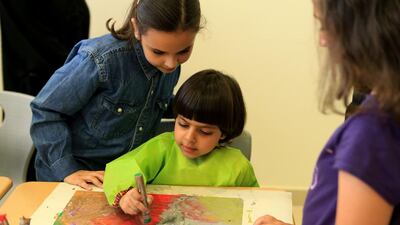ABU DHABI // Autistic children are being taught new skills as part of a six-week pilot scheme at the Emirates College for Advanced Education.
Goals UAE and the college joined hands to offer music, art and Quran recitation classes on every Monday until the end of the month.
Students at the college studying special needs and applied behavioral analysis will befriend the children and offer them support and encouragement.
“The progress has been great,” said Khawla Barley, founder of Goals UAE, an initiative for autistic children to engage in mainstream activities.
“During the first week they were more hesitant because they are learning in the classroom and their hands-on experience would be more limited,” she said.
“On the second week, I saw them getting more engaged and interested.”
One of the problems facing autistic children is the inability to engage in group activities or interact with others.
However, autistic children, like their peers, needed to participate in activities on a daily basis to develop their sense of engagement with others, said Ms Barley.
Last year, Goals UAE organised after-school football training sessions for autistic children.
For Ms Barley, it was a starting point for a larger programme that puts together other activities for autistic children like her son.
As much as the programme is changing constantly, Goals UAE also raises awareness about autism and introduces children to interacting with their peers with learning disabilities.
“We started with football because it seemed easier and popular, but I wanted to develop a programme based on what the community really wants,” said Ms Barley.
“One mother said to me that all the centres have western teachers and western activities and it’s very hard to keep them [the students] connected to their culture.”
The pilot scheme is halfway towards completion, with Emirati students at the college helping autistic children to maximise their learning potential and boost their strengths and interests.
“We’re learning every week and it’s getting better and better,” said Dr Michelle Kelly, a behavioural analyst and assistant professor at the college’s health and special education department.
Alia Al Ketbi, 28, a student of applied behaviour analysis, said autistic children get bored easily, which is where the pilot programme came into play.
“These interesting activities help to keep them engaged and focused,” she said.
“They need us to be with them and also feel excited when they take part in an activity, so they won’t lose their concentration.
Sara Al Ameri, a 26-year-old Emirati student volunteer, said autistic people tended to be really quiet and insular.
“I think having kids with the same disability will help them feel that they’re not alone,” she said.
The first session, which starts at 4.30pm, is devoted to Quran recitation. The children are later split into two groups for the arts and music classes.
“At one of the art sessions, there’s a very talented child who chose to paint the Angry Birds design on a shirt,” said Ms Al Ameri. “And in another class, assistants and the children would play some instruments and sing along with their music teacher.
“Usually, children with autism are very talented and gifted, so you can find someone who can’t speak but can sing his heart out.”
For the first three weeks, the first batch of children attended the music sessions, while the second batch took art classes. Both groups will switch classes for the latter half of the programme.
“It’s been really fun and very rewarding,” said Dr David Knapp, a music professor at the college.
“Children with autism will respond differently to instruments of different sound textures.
“Maybe one student would like a sound that’s more percussion, just like the cabasa, but another day they would like something else.
“Children want stimulus and that stimulus can be visual and auditory, so that’s why I choose a wide variety of instruments.”
rruiz@thenational.ae

